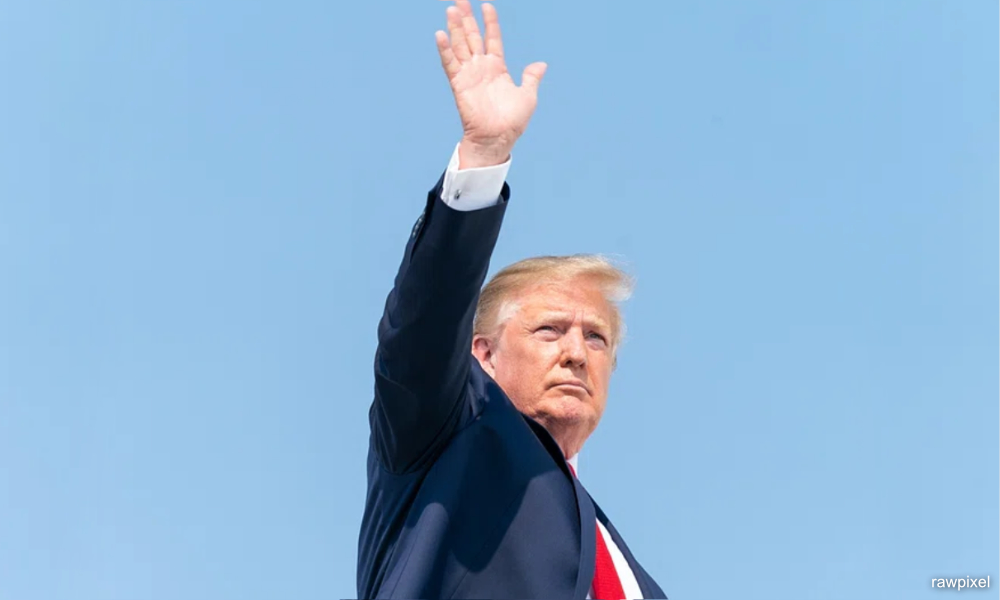
Published by TheStar, MySinchew, and Marketingmagazine image by AstroAwani.
There are moments when protocol collides with principle. Trump’s visit to Kuala Lumpur, staged with spectacle, was one such moment. To many Malaysians it felt like the surrender of moral authority. EMIR Research has consistently argued that Malaysia’s strength lies in credible neutrality, dignity in the Global South, and policy anchored in justice.
Hosting a figure repeatedly identified with enabling genocide already sits at odds with that stance. EMIR Research warned that rolling out the red carpet would trade Malaysia’s hard-won moral capital for a fleeting photo opportunity. A nation’s credibility is worth more than a handshake that sanitises harm.
If the optics were troubling, the substance is worse: behind the rhetoric of “reciprocity” lies a deal that embeds U.S. preferences deep within Malaysia’s regulatory, digital, and security architecture—making us rule-takers in our own industrial future.
EMIR Research long warned of the quiet trade-offs hidden in tariff politics. In “Reciprocal Tariffs Revisited: Relief for Some, Sovereignty for Sale?” we cautioned that tariff “relief” often masks geostrategic alignment, a silent loss of regulatory autonomy dressed as market access.
The most troubling clauses strike at the heart of Malaysia’s sovereignty. Article 5.1 binds Malaysia, upon U.S. notification, to adopt “equivalent” restrictive measures on third countries, tying our trade stance to American economic or national-security actions. Article 5.2 then explicitly pushes that alignment into national security terrain, requiring cooperation on security-sensitive technologies, alignment with unilateral U.S. export controls, and restrictions on dealings with entities on U.S. sanctions lists. Taken together, these provisions subordinate our foreign-economic policy to another capital’s priorities, replacing independent strategic choice with compliance by default.
Our economic and industrial sovereignty is equally eroded. Articles 6.1 to 6.3 require Malaysia to promote U.S. investment in strategic sectors such as energy, telecommunications and infrastructure, while also committing us to facilitate about USD 70 billion of investment in the United States over the next decade. The United States may demand information on Malaysian subsidies and compel “corrective” action if they are deemed distortive. Such provisions not only weaken our ability to pursue state-led industrial policy, a tool every successful late-industrialiser once relied on, but also risk crowding out investment and credit needed for domestic innovation and industrial upgrading. The result is a development strategy increasingly shaped by external validation rather than national priority.
In the technological and digital sphere, the loss of sovereignty is even more pronounced. Articles 3.1 to 3.5 forbid Malaysia from imposing a digital-services tax on U.S. firms, constraining a fiscal instrument established under our own domestic law. They also restrict our ability to regulate data flows and require consultations with Washington before entering any new digital trade agreements. Article 3.4 prohibits technology-transfer or localisation requirements, removing tools essential for building national capability. In effect, Malaysia cedes control over its digital future, the very domain that will determine competitiveness in the decades ahead.
Fiscal and trade policy are also curtailed. Article 2.12 obliges Malaysia to “coordinate and endeavour to align” its border measures with any future U.S. border-adjusted taxes, while prohibiting value-added-tax distinctions that disadvantage American firms. Together with a pledge not to challenge U.S. export rebates at the WTO, these provisions restrict our fiscal manoeuvrability and multilateral defences. They narrow the government’s ability to shape tariffs, incentives, or counter-cyclical tools responsive to local realities.
Our strategic autonomy is further compromised by clauses that blur the line between trade and security. Section 5 mandates alignment across export controls, shipping, and even defence procurement, prohibiting nuclear-energy purchases from specified countries unless no U.S.-approved alternative exists. This effectively places Malaysia’s national-security choices under American scrutiny and undermines our doctrine of active neutrality—one of the cornerstones of ASEAN stability.
Taken together, these commitments amount to a structural dependency disguised as partnership. Each clause may appear technical, but collectively they codify a hierarchy in which Malaysia bears fixed obligations while the United States retains unilateral discretion—including the right, under Article 7.4, to impose further tariffs whenever it “considers” Malaysia non-compliant.
The price of this asymmetry is not only policy space but developmental freedom. By surrendering control over standards, sanctions, and technology policy, Malaysia risks mortgaging the very levers required for long-term resilience, diversification, and national progress.
EMIR Research’s position on tariff politics has been consistent: do not retaliate blindly, but never concede sovereignty for short-term relief (for example, “Embracing Disruption, Driving Transformation: Malaysia’s Strategic Response to Trump Tariff Turbulence”). Build resilience by moving up the value chain, diversifying markets and currencies, and insisting on transparency in every concession. The real cost of “deals” is often paid later in diminished autonomy, not in immediate tariff relief (refer to “Reciprocal Tariffs Revisited: Relief for Some, Sovereignty for Sale?”).
Across ASEAN, Malaysia’s version of this so-called “reciprocal” agreement stands out as unusually restrictive. Only Cambodia has concluded a similar framework, yet even its text contains explicit safeguards stating that implementation must not “infringe Cambodia’s sovereignty” and confines alignment to economic—not national—security. Thailand and Vietnam are still negotiating, while Singapore and Indonesia have not even entered the framework. Why then did Malaysia sign so hastily such a critical document?
Equally troubling are the economic commitments embedded in the annexes. Malaysia is required to facilitate about US$70 billion (RM293.8 billion) in outbound investment to the United States over the next decade, primarily aimed at job creation there. This alone represents an inversion of developmental logic for a capital-importing economy.
Separately, the agreement also points to large-scale procurement from U.S. suppliers, including aerospace, energy and digital infrastructure sectors. Although described as commercial transactions, these purchases will inevitably involve government-linked corporations such as Malaysian Aviation Group (Malaysia Airlines) , Petronas, Telekom Malaysia, Tenaga Nasional Bhd, with long-term fiscal implications for public balance sheets. Together, these obligations risk locking Malaysia into high-cost, foreign-serviced systems that significantly shrink the space for domestic industry and innovation. The combined exposure could exceed RM1 trillion (US$240 billion) over time.
Beyond substance, the manner in which this agreement was concluded compounds the concern.
The process itself raises serious governance concerns. A parliamentary select committee on foreign affairs should urgently determine whether the Cabinet had full sight of the agreement before it was signed, whether inter- and intra-ministerial consultations and standard operating processes were completed, and whether legal, economic and security assessments were properly conducted involving subject matter experts. The magnitude and permanence of these obligations demand scrutiny of the highest order. What is now evident is that this agreement potentially breaches Malaysia’s sovereign and security boundaries in clear and measurable ways.
Clauses that compel alignment with a foreign power’s sanctions, export controls and national-security policies strike at the constitutional principle of self-determination. Even if unintended, the act of binding Malaysia to another nation’s security architecture represents a profound lapse in institutional oversight—one that must be addressed transparently and corrected without delay.
Yet the path forward must be constructive. EMIR Research proposes that Malaysia invoke Article 7.3, which allows reasonable modifications and amendments which will be applicable 60 (sixty) days after the date on which the Parties exchange written notification, to introduce sovereign carve-outs and compliance clauses ensuring that our Constitution and domestic laws take precedence wherever conflict arises. Should amendments prove insufficient, Article 7.5 provides for termination with due notice—though that route must be weighed carefully. A multidisciplinary taskforce of legal, economic, and technical experts should immediately be convened to review each article, propose protection language, and realign the agreement with Malaysia’s national interest.
This is no longer about partisan politics. It is about safeguarding the nation’s future and restoring the moral and strategic compass that defines Malaysia’s place in the world. EMIR Research’s call is simple: act swiftly, transparently, and in unity to amend what can be amended, protect what must be protected, and ensure that never again will a document of such consequence slip past the nation’s collective scrutiny.
Dr Rais Hussin is the President / CEO of EMIR Research, a think tank focused on strategic policy recommendations based on rigorous research.
